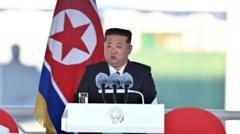Recent detentions of writers in China's Boys' Love genre highlight ongoing tensions between cultural expression and governmental censorship, raising concerns about freedom of speech.**
Crackdown on Boys' Love Writers in China Sparks Outcry**

Crackdown on Boys' Love Writers in China Sparks Outcry**
The Chinese government intensifies enforcement against authors of gay erotic fiction, detaining dozens amid rising censorship.**
In a significant escalation concerning the censorship of gay-themed content, Chinese authorities have detained numerous writers involved in the Boys' Love (BL) genre, which features romantic narratives between male characters. This genre has gained immense popularity in China since its introduction from Japan in the 1990s, particularly among straight women. However, the genre, previously celebrated for its vibrant storytelling, has come under increasing scrutiny by the state.
Reports indicate that dozens of writers, especially younger figures, are being interrogated and prosecuted for producing what are classified as "obscene" works. In particular, at least 12 authors faced charges in Anhui Province last year, with ongoing investigations affecting other writers, demonstrating the state's intensified focus on regulating this literary form. One young graduate student, whose online romance novel incorporated steamy content, now faces potential criminal penalties despite earning modest income from her work.
Amid this crackdown, Boys' Love narratives, which offered a counter-narrative to conventional portrayals of gender roles and sexuality, experienced a surge in mainstream visibility, inspiring popular television dramas and fostering careers for male actors. The genre's acceptance has notably diminished, however, as state media increasingly labels it as "vulgar," worrying that it may undermine traditional values and influence youth.
This campaign against LGBTQ+ narrative expressions can be understood within the broader context of Chinese cultural production, where censorship continues to clash with evolving social attitudes. The censorship extends beyond literature, with adaptations of Boys' Love stories being banned on television and online platforms, reflecting a pattern seen in previous years when prominent authors faced severe penalties, including lengthy prison sentences. As the crackdown continues, advocates and readers alike fear for the future of LGBTQ+ representation and artistic freedom in China.
Reports indicate that dozens of writers, especially younger figures, are being interrogated and prosecuted for producing what are classified as "obscene" works. In particular, at least 12 authors faced charges in Anhui Province last year, with ongoing investigations affecting other writers, demonstrating the state's intensified focus on regulating this literary form. One young graduate student, whose online romance novel incorporated steamy content, now faces potential criminal penalties despite earning modest income from her work.
Amid this crackdown, Boys' Love narratives, which offered a counter-narrative to conventional portrayals of gender roles and sexuality, experienced a surge in mainstream visibility, inspiring popular television dramas and fostering careers for male actors. The genre's acceptance has notably diminished, however, as state media increasingly labels it as "vulgar," worrying that it may undermine traditional values and influence youth.
This campaign against LGBTQ+ narrative expressions can be understood within the broader context of Chinese cultural production, where censorship continues to clash with evolving social attitudes. The censorship extends beyond literature, with adaptations of Boys' Love stories being banned on television and online platforms, reflecting a pattern seen in previous years when prominent authors faced severe penalties, including lengthy prison sentences. As the crackdown continues, advocates and readers alike fear for the future of LGBTQ+ representation and artistic freedom in China.





















